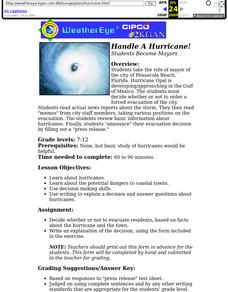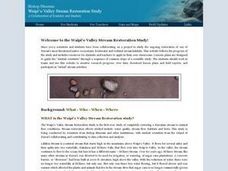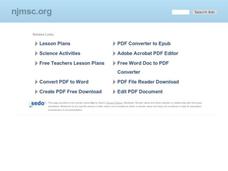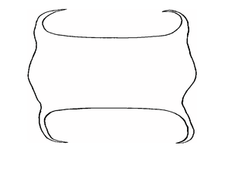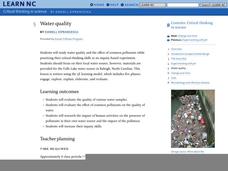Curated OER
China's Giant Panda
Third graders read an article called "All About Pandas." In this Panda instructional activity, students become familiar with the connection of the Panda to Chinese culture. Students recognize that Pandas are endangered. Students...
Curated OER
Inquiry and the Nature of Science
Students identify questions that can be answered through scientific investigations, design and conduct a scientific investigation. They also use appropriate tools and techniques to gather, analyze, and interpret data.
Curated OER
The Differences Between the Earth and the Moon
Fifth graders identify the physical characteristics of the Earth and compare them to the physical characteristics of the moon. They produce a chart with Microsoft Excel to record the physical characteristics of both the Earth and the moon.
Curated OER
Handle A Hurricane! Students Become Mayors
Students take the role of mayor of the city of Pensacola Beach, Florida
Curated OER
History of Water Use in Hawaii
Students research water use in Hawaii and use primary and secondary sources to determine the impact of restoration of the L?l?kea stream on stream flow, water quality, habitat and biota.
Curated OER
Aruba Cloud Cover Measured by Satellite
Young scholars analyze cloud cover over Aruba. They compose and submit written conclusions which include data, analysis, errors in data collection, and references.
Curated OER
Skates
Students gain understanding of structure, characteristics, and basic needs of living things and their role in world, identify parts of skate, observe details of skate's body and skate egg case, and identify unique characteristics of skates.
Curated OER
Noah's Ark, Revisited
Fourth graders do a visual presentation for a specific endangered species.
Curated OER
Webbing the Food Chain
Students compose a visual representation of the food chain cycle using Inspiration educational software.
Curated OER
Illinois County Dragonfly Poster
Students identify the dragonflies found in their Illinois County by using the Odonata database list to find the scientific names, searching field guides and the Internet for (1) the common name (2) description (3) life habits and (4) a...
Curated OER
Butterfly/Moth Poster
Students learn how to identify which species of dragonflies or butterflies are found in their County by learning to read the Odonata or Lepidoptera checklist to find the scientific names; they also search field guides and the Internet...
Curated OER
ABC's of Dinosaurs
Young scholars develop an ABC Book using KidPix Productivity software to create a multimedia slide show applying all they have learned about dinosaurs. They participate in a virtual field trip to find information.
Curated OER
The Day the Water Ran Out
Middle schoolers explore ecosystems by researching desert characteristics. In this drought lesson, students identify the potential impacts of a drought on their home state and interview people who are familiar with water studies. Middle...
Curated OER
Animal Activities: Just the tracks, ma'am
Students learn most urban mammals are nocturnal and are difficult to observe. One of the simplest ways to determine the kinds of animals living in your neighborhod is to track them down.
Curated OER
Ecosystems
Sixth graders perform various labs, create presentations, and do hands on activities to explore the ecosystem.
Curated OER
Water Quality
Students investigate the properties of oil and water by making marbleized paper. They examine fish species by making Japanese fish prints and 3-D cardboard fish. They create posters that present messages about conserving our waterways.
Curated OER
What are Quarters Made of?
Pupils study the meaning, symbolism, and value of U.S. coins,
especially the quarter. They l research why in 1965 the U.S. Mint decided to
change the metal composition of the quarter to copper coated with zinc. In addition, they perform...
Curated OER
Hottest, Coldest, Highest, Deepest: Science, 4th Grade
Fourth graders investigate weather patterns in their home state of Utah. After creating KWL charts, they research weather and geographical data to locate the state's extremes. As an extension, 4th graders write and illustrate books about...
Curated OER
Lifting Fingerprints
Students examine the uniqueness of each other's fingerprints through the dusting and lifting of them. They use stamp pads, powder, brushes, etc. to collect as many different prints as they can.
Curated OER
Predicting the Greening of Spring With Red Emperor Tulips
Students examine seasonal changes by watching tulip plant growth across the continent utilizing the Journey North website. They develop hypotheses as to why the plants emerge and grow where they do.
Curated OER
Ecology - Ecosystem
Third graders research ecosystems, the work of ecologists, John Muir's contribution to the environment and an endangered species of their choice. They read books, participate in discussions, and write reports.
Curated OER
Bioethics of Stem Cells
Learners complete a variety of activities as they examine the ethics behind stem cell research and use.
Curated OER
Create a Compass Instructions for Teachers
Students, who are teachers, discover how to make box and water compass in their classrooms. They describe the scientific principles that are involved in making and using a compass.





